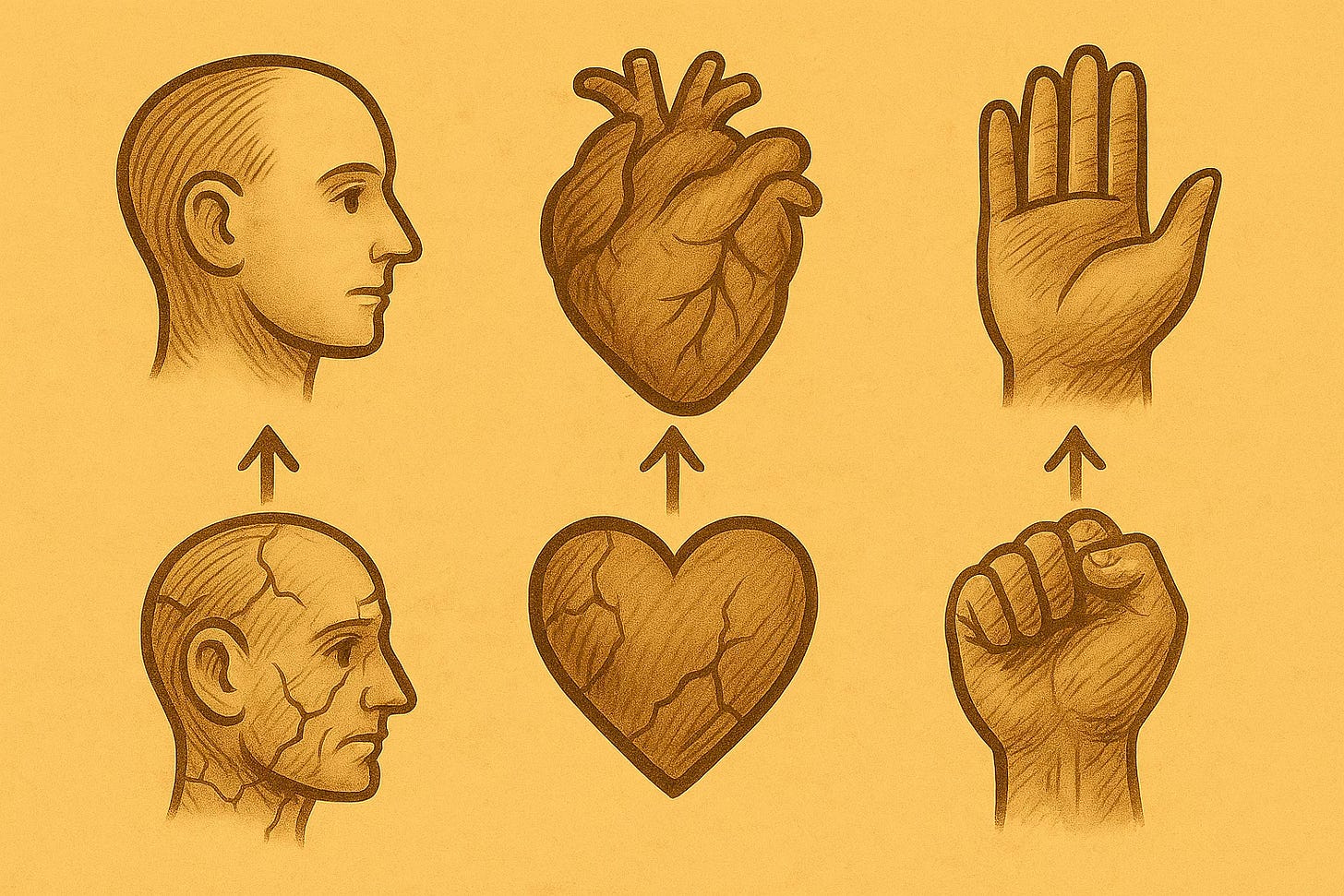The Upside-Down Kingdom: Living Right-Side Up in Christ
Step Two: A Softened Heart—Grieving Sin and Hungering for Holiness
Part 3 of 20 | The Upside-Down Kingdom: Living Right-Side Up in Christ
Introduction: The Grace-Filled Posture of a Softened Heart
Once we realize our deep need for God, Jesus takes us further. He doesn't call us to move on from brokenness but to move through it—to feel it deeply and to let it shape us. In the next three Beatitudes, Jesus describes a heart that has been softened by grace: one that mourns over sin, walks humbly in meekness, and longs for righteousness more than anything else.
In Matthew 5:4–6, we find blessings that fly in the face of everything the world prizes: emotional resilience, assertiveness, and self-satisfaction. Yet Jesus says true comfort, true inheritance, and true satisfaction belong to those who are broken over their sin, gentle in spirit, and ravenous for holiness. These are not weak people—they are people being transformed by grace from the inside out.
Explanation: What It Means to Mourn, Be Meek, and Hunger for Righteousness
“Blessed are those who mourn, for they shall be comforted.” This mourning is not over life’s general hardships—though Jesus deeply cares for those who grieve. This is spiritual mourning: a sorrow over sin—our own and the brokenness of the world around us. The Greek word used here is πενθέω (pentheō), which means to lament, grieve, or wail with deep sorrow. It’s the same word used to describe mourning the dead (Matthew 9:15), signifying a profound, heart-wrenching response. This is not casual remorse—it’s the broken-heartedness of Isaiah saying, “Woe is me!” (Isaiah 6:5), or Peter weeping bitterly after denying Jesus (Luke 22:62). This kind of grief is redemptive—it’s the godly grief Paul speaks of that leads to repentance and salvation without regret (2 Corinthians 7:10). And Jesus promises comfort—not through denial or distraction, but through His mercy.
“Blessed are the meek, for they shall inherit the earth.” Meekness is not weakness or passivity. The Greek word πραΰς (praus) refers to strength under control, often used to describe a powerful animal that has been tamed. It’s a posture of humility before God and gentleness toward others. Meekness doesn’t demand recognition or react in pride. Instead, it waits patiently on the Lord (Psalm 37:11, echoed in this Beatitude). Meekness trusts God to settle accounts, defend reputations, and establish our future. As Peter writes, “Humble yourselves under the mighty hand of God, so that at the proper time he may exalt you” (1 Peter 5:6). In a world that rewards bold assertion and self-promotion, Jesus blesses the quietly surrendered.
“Blessed are those who hunger and thirst for righteousness, for they shall be satisfied.” The language here is intensely vivid. Jesus uses πεινάω (peinaō) for “hunger” and διψάω (dipsaō) for “thirst”—both verbs describe desperate craving, not mild interest. These are the longings of someone starving and parched. But what are they longing for? δικαιοσύνη (dikaiosynē)—righteousness. This isn’t self-righteousness or moral superiority. It’s a yearning for right standing with God and right living that reflects His holiness and justice. It’s the desire for God’s will to prevail in us and around us—personally, relationally, and societally. And the promise? They shall be satisfied. Not might. Not eventually. Jesus assures us that those who crave the things of God will be filled—deeply, abundantly, and continually (Psalm 107:9; John 6:35).
Together, these Beatitudes describe the shape of a heart that has first been made poor in spirit. The person who sees their spiritual bankruptcy (Matthew 5:3) begins to mourn over sin (v.4), walks in meekness before God and others (v.5), and develops a hunger for the righteousness they do not have on their own (v.6). This is the progression of grace: emptiness, brokenness, yieldedness, and longing. And to such hearts, Jesus does not offer condemnation—but blessing, comfort, inheritance, and satisfaction. This is the journey of Kingdom transformation—from the inside out.
Exemplification: A Heart Shaped by Grace in Scripture and Life
King David is a prime example of all three Beatitudes in action. In Psalm 51, after his sin with Bathsheba, he mourns: “Against you, you only, have I sinned” (v. 4). He does not deflect or minimize; he owns his sin before God. He confesses with a contrite heart, refusing to justify himself. His words reflect meekness—he does not demand leniency, but pleads for mercy as one who knows he has nothing to offer but repentance. And he hungers for inner transformation when he prays, “Create in me a clean heart, O God” (v. 10)—the cry of a man who not only wants forgiveness, but righteousness restored. His grief is not paralyzing, but purifying. This is spiritual mourning that leads to renewal, meekness that yields to God’s justice, and a hunger that drives him back into communion with his Redeemer.
Jesus Himself perfectly embodied this posture. He mourned over Jerusalem with tears of holy grief (Luke 19:41), aching for the people who rejected peace. He described Himself as “gentle and lowly in heart” (Matthew 11:29)—the very definition of praus, meekness incarnate. And He hungered to do the Father’s will, declaring, “My food is to do the will of him who sent me” (John 4:34). Even on the cross, Christ fulfilled all three: He bore the sorrow of the world’s sin, yielded Himself in meek submission, and accomplished the righteousness required for our salvation. Christ not only preached these truths—He lived them to the fullest, giving us not just commands to follow, but a life to emulate and a Savior to trust.
In counseling ministry, I’ve seen true transformation when people stop defending themselves and start grieving sin. It’s in those sacred moments—when eyes fill with tears and excuses fade—that comfort begins. I've witnessed the quiet power of meekness when someone lays down their right to retaliate and chooses to forgive instead. And I’ve watched hope rise when someone no longer hungers for control, validation, or image management—but hungers to be clean, to be whole, to be near to God. These moments are not emotionally engineered—they are the fruit of grace softening the heart and drawing it into deeper surrender to Christ.
Exhortation: Living the Softened Heart of the Kingdom
Invitation – What Christ Invites Us Into
Jesus invites us to bring Him our broken hearts, our humbled spirits, and our holy cravings. He doesn’t require spiritual polish—He welcomes spiritual poverty expressed through sorrow, surrender, and thirst. Mourning over sin is not about emotionalism, but about rightly responding to the holiness of God and the weight of our rebellion. Meekness is not natural—it is supernatural strength restrained by grace. Hunger for righteousness is not self-improvement—it’s a Spirit-born craving for right standing with God and right living before others. These Beatitudes are not natural temperaments; they are Spirit-produced realities.
Implementation – What This Looks Like Today
Mourning sin means not rushing past conviction or justifying wrong attitudes. It looks like confessing before defending, grieving what grieves God, and allowing the weight of sin to drive us to the cross rather than to despair. Meekness shows up in daily interactions—responding with gentleness instead of control, choosing humility over dominance, and trusting God to be your defender. Hungering for righteousness reshapes how we approach Scripture—not as a task, but as a meal. And in seasons of spiritual dryness, this hunger often looks like continuing to seek God’s Word and presence even when the emotions feel flat—an act of faith that echoes the cry, “O God, you are my God; earnestly I seek you… my soul thirsts for you” (Psalm 63:1). It is a quiet, determined trust that “the Lord is good to those who wait for him, to the soul who seeks him” (Lamentations 3:25). It reorders how we spend our time, view our trials, and pursue justice. A softened heart is attentive—not just to sin, but to the presence and promptings of the Spirit.
Application – How We Live It Out Faithfully, by Grace
We live this out by keeping our hearts sensitive to God and surrendered to His Word. In a world that applauds numbing, distraction, and self-promotion, Kingdom people are called to feel deeply, respond humbly, and pursue holiness earnestly. Grace doesn’t eliminate the fight for righteousness—it energizes it. As we mourn, we are reminded of Christ who bore our griefs (Isaiah 53:4). As we walk in meekness, we follow the One who was led like a lamb to the slaughter without opening His mouth (Isaiah 53:7). As we hunger and thirst for righteousness, we remember the promise: we will be satisfied—not with the world’s offerings, but with Christ Himself. In this way, the softened heart becomes the soil where lasting transformation takes root.

Conclusion: The Pathway to Comfort, Inheritance, and Satisfaction
The world says, “Protect your heart. Exalt yourself. Follow your cravings.” Jesus says, “Let your heart be broken. Be meek. Hunger for Me.” He flips the script of self-preservation and self-promotion, calling us to the narrow road of surrender—and He meets us there with unimaginable grace. What does He promise? Not rejection, but divine comfort for our sorrow, eternal inheritance for our meekness, and deep soul satisfaction for our hunger. These are not symbolic rewards—they are the real fruit of life in Christ. A softened heart may feel exposed and costly in the moment, but it is the soil where joy, strength, and fullness grow. In the upside-down Kingdom, what the world calls weakness, Jesus calls blessed.
The Counselor’s Call: Koinonia 59’s Conclusion and Final Charge
Dear friend, these Beatitudes are not just poetic blessings—they are powerful invitations. They are not ideals reserved for the spiritual elite, but pathways for everyday disciples who long to be formed in the image of Christ. If we want to walk in Christlikeness, we must allow the Spirit to soften us: to weep over sin, to yield our strength, and to crave righteousness—not out of duty, but from a heart awakened by grace. These are not signs of weakness—they are evidence that the King is at work in His people.
And we do not walk this road alone. We do not mourn alone. We do not grow meek in isolation. We do not hunger in vain. We do it in Koinonia—in the fellowship of the Church, where broken hearts are comforted, humble voices are heard, and holy hunger is met with deeper grace. Together, we confess, repent, rejoice, and walk with one another—not around the hard things, but through them, with Christ at the center.
🫀 Koinonia Kardiology: The Word that Works on the Heart (Matthew 5:4–6)

Matthew 5:4–6 continues Jesus’ radical redefinition of what it means to be truly blessed. In a world that equates blessing with ease, dominance, and self-fulfillment, Jesus pronounces blessing on those who mourn, who are meek, and who hunger—not for pleasure, but for righteousness. These verses uncover the inner landscape of a heart being reshaped by grace: sorrow over sin, surrender of self, and a deep longing for holiness. Each Beatitude chisels away at our pride and comforts us with the promise that God draws near to the brokenhearted (Psalm 34:18). Far from condemning the crushed, Christ calls them His own and assures them that comfort, inheritance, and satisfaction await those who walk in humility and hunger for Him.
1. Head (Cognitive)
Thinking, Knowing, Believing, Reasoning, Remembering
Jesus redefines what blessing looks like.
Blessing is not found in strength but in sorrow over sin (v. 4).
True power is expressed in meekness, not dominance (v. 5).
Satisfaction doesn’t come from indulgence, but from craving righteousness (v. 6).
Let these truths challenge your assumptions and renew your perspective.
2. Heart (Affectional)
Desiring, Valuing, Worshiping, Feeling, Emoting
Jesus speaks to the affections: what do we grieve, cherish, and long for?
A softened heart mourns sin and loves holiness.
It delights in gentleness and humbly yields to God.
It treasures righteousness more than comfort.
Let your affections be realigned to the heart of Christ.
3. Hand (Volitional)
Willing, Deciding, Intending, Committing, Acting
Jesus calls us to live out this softened posture.
Confess your sin quickly and sincerely.
Choose gentleness in your relationships.
Pursue righteousness in how you spend your time and energy.
Transformation isn’t passive—it’s practiced. Grace empowers what Christ commands. Let this work of grace continue in you—not rushed, not forced, but real. As you yield your sorrow, your strength, and your desires to Christ, trust that He is forming in you the heart of a Kingdom citizen—one who reflects His beauty in quiet, faithful ways the world cannot ignore.
So as you reflect on these Beatitudes, ask God to work in all three chambers of your heart—renewing your mind with truth, softening your affections with grace, and directing your will toward obedience. He is not distant from the broken; He draws near. He is faithful to comfort the mourner, strengthen the meek, and satisfy the soul that hungers for Him. Trust that the Spirit who awakens these desires will also complete the work He begins in you.
Five Gospel-Driven, Action-Inducing Reminders
Brokenness is the beginning of healing.
Meekness is not weakness—it’s strength under surrender.
Hunger for righteousness is a sign of spiritual life.
God comforts those who grieve over sin.
A softened heart is fertile soil for Kingdom living.
5 Personal Reflection Questions
When was the last time you truly mourned over your sin?
What situations in your life reveal whether you walk in meekness or pride?
What are you hungering and thirsting for most right now?
How do these verses reshape your understanding of blessing?
What would it look like to cultivate a “softened heart” this week?
5 Group Study Questions
Why does Jesus connect mourning with comfort in the Kingdom?
How is meekness different from being passive or timid?
How can we encourage one another to hunger more for righteousness?
What spiritual disciplines help keep our hearts soft before the Lord?
In what ways can your group model this kind of Kingdom posture in your community?
A Preview of Step Three
Step Three: A Changed Character – Living as the Pure, Merciful, and Peaceful
📖 Passage: Matthew 5:7–9
As Jesus continues His Kingdom description, He now turns to the visible fruit of a heart transformed by grace. Those who know mercy show mercy. The pure in heart see God because their desires have been refined. Peacemakers reflect the very heart of Christ, bringing reconciliation where there was once division. This section reveals how God shapes not only what we believe and feel—but how we treat others.
“Blessed are the merciful, for they shall receive mercy. Blessed are the pure in heart, for they shall see God. Blessed are the peacemakers, for they shall be called sons of God.” — Matthew 5:7–9
Prepare to explore how Christ reshapes your character and relationships through the refining fire of mercy, purity, and peace.
Thanks for reading Koinonia 59 !
This space exists to reflect on biblical counseling, theology, and life in Christ—with a heart for truth, grace, and growth in community.
If something here encouraged or challenged you, feel free to share it or join the conversation in the comments.
📬 Not subscribed yet? You can do that below and stay connected as posts come.
📖 “But far be it from me to boast except in the cross of our Lord Jesus Christ…” — Galatians 6:14 (ESV)







Thank you for the greater explanation of Matthew 5:4-6! WOW!